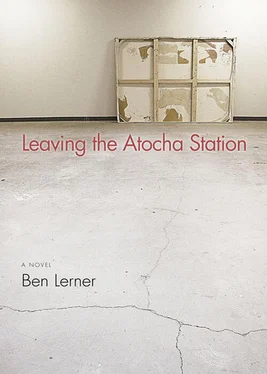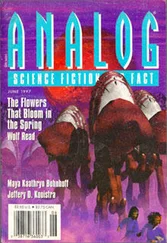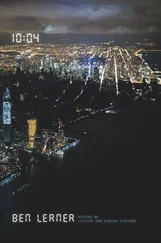“The poems you read — what were they about?” she asked, after a long silence that said, “Why didn’t you invite me?.”
I was also silent for a while, then stopped and turned to her and put my hands on her shoulders, which I never did, and looked her in the eyes, which sounds ridiculous, and said, tenderly, “Poems aren’t about anything.”
“Poems aren’t about anything,” she repeated, largely to herself, perhaps with a hint of incredulity or bemusement or scorn, and it wasn’t clear to me whether its significance was spreading out. I kissed her in case that helped the resonance expand.
By the time we reached the car I felt the balance of our relationship had been restored; I believed Isabel felt it too, and in a rush of optimism, she decided we should, in fact, visit Rufina. It was dark now as we drove across the ramparts and after fifteen minutes or so of confusing, curving roads, we pulled off into a gravel driveway. During the drive Isabel started and abandoned various descriptions of her aunt, attempting to avoid disparaging her in any way, which suggested affinity and respect, while also trying to warn me, it was unclear regarding what. Finally she managed, haltingly, to say something about a fight over Isabel’s ex-boyfriend, a fight arising, I thought she said, from Rufina’s protectiveness of Isabel, her sense that Isabel had been treated poorly, but a bad fight nonetheless.
Rufina’s house was small, white, boxy, two stories, but set on a large expanse of land, which I assumed, during the day, offered prospects of the distant hills, or were those mountains. Dogs appeared as we approached the house, recognizing Isabel, who greeted them in the dark by name. We rang the bell and I could hear the radio inside. The door opened and Rufina appeared; I was stunned by her youth, she looked thirty, shapely, and was made up as if about to go out for the evening — eye shadow and lipstick, clothes that seemed selected carefully — despite the fact that she was in the country, alone. I thought she might have missed a beat between seeing us and greeting Isabel warmly, but the greeting was, when it came, very warm; as she held Isabel’s face and wiped off her lipstick with her thumbs, I thought one or both of them might cry; Rufina was pressing hard. She released Isabel, kissed me quickly on both cheeks, and told us to come in, shutting out the dogs. We followed her into the kitchen where, without asking us what we wanted, she took out three tall glasses, gin from the freezer, and a bottle of tonic from the fridge. She put ice in the glasses and poured the cocktails in the Spanish manner, filling each glass almost entirely with gin, barely cutting it with tonic, then led us with our drinks to an enclosed and heated porch where we sat down in low cane chairs and near-dark.
I squinted at Rufina, waiting for my eyes to adjust. She and Isabel were obligatorily catching up, the Spanish so fast and full of slang I didn’t even try to comprehend it; after a minute or two, the rush of small talk tapered into silence. Rufina took a long match from a box somewhere within her reach and lit a cigarette and I thought she looked mean and attractive in its light, her appeal perhaps amplified by the fact that I’d spent the day imagining a visit to an elderly aunt. Isabel looked nervous, adjusting her hair; it was clear this was the first time they’d seen each other since the aforementioned fight. Rufina held the match toward me, shook it out. Why Isabel had brought me I found baffling, she certainly made no effort to introduce me into the conversation; I could only suspect my presence was a restraint, that Isabel wanted to work out whatever was between them, and hoped Rufina would rein in her behavior and talk in the company of a stranger, especially talk about a previous boyfriend. The silence was evidently oppressive to Isabel, who knew I wouldn’t break it, and finally she rose and said she had to go to the bathroom, leaving me with Rufina. I was in fact very interested in Rufina, in how she made a living, where she was from, how long she had lived outside Toledo and why, not to mention how old she was, if she was married, if she was Isabel’s blood relation, what had happened with the boyfriend, etc., but I wasn’t about to speak. After another length of silence, Rufina stood up, saying something about my drink, which she took to the kitchen to refill.
Alone on the porch, I looked out into the dark; I imagined I could see the dogs moving somewhere in the yard, and far beyond the yard I could see a few ruby taillights disappearing on a curve. I began to imagine my apartment in Madrid, imagined it at that instant, dark, but filled with noise from La Plaza Santa Ana, imagined the espresso machine at rest, the cheap but inoffensive furniture the apartment came with, furniture that would remain when I left, the few old postcards I’d purchased from El Rastro and scotch-taped to the wall. Then my other rooms: Brighton Street, mattress on the floor, Hope Street, with its little drafting table, dorms, which were terrible, then Greenwood, Jewell Street, Huntoon and my crib, which I could not in fact remember, imagined them at that instant, now furnished and occupied by others. Then I could feel each room around me as I imagined it, and the dark beyond the porch would become the dark of Topeka or Providence. Then it was the dark of my seventh or fifteenth or twentieth year, each dark with a slightly different shape or shapeliness, the sky, when I was younger, more concave. And then it was Rufina’s porch again, but imagined from a future room surrounded by a future dark, a room where I was writing, maybe this.
At some point I realized I had been lost in these reveries, if that’s what they were, for longer than it took to make a drink or take a piss. I listened hard and could hear voices, voices I could tell were raised; Isabel and Rufina were arguing somewhere in the house, in a room whose door they’d shut. I became fascinated with this phenomenon of hearing loud voices at a distance, in trying to account for how I knew they were loud when I could barely hear them, something about their shape or shapeliness, or the way they filtered through the walls, and I reached for my notebook to write this down, although there wasn’t really light to write by, when suddenly I stopped and blushed, at least my face was hot. Why would I take notes when Isabel wasn’t around to see me take them? I’d never taken notes before; I carried around my bag because of my drugs, not because I intended to work on my “translations,” and the idea of actually being one of those poets who was constantly subject to fits of inspiration repelled me; I was unashamed to pretend to be inspired in front of Isabel, but that I had just believed myself inspired shamed me.
I took my notebook from the bag, but only to use it as a surface; I rubbed a cigarette between my thumb and forefinger to loosen the tobacco and emptied it onto the notebook cover. Then I took the little egg-shaped mass of hash out of my pocket, so shaped because it had been transported, wrapped in plastic, up someone’s ass, found my lighter, heated and flaked a quantity of hash into the tobacco, then blew carefully into the empty cigarette paper, inflating it a little, and shook the mixture back into the cigarette, twisting the end of the paper to keep it from spilling. Finally, I removed the cottony filter with my teeth. The voices were getting louder.
I lit the spliff and imagined what was happening inside, my first projections borrowed almost entirely from Spanish cinema: Rufina and Isabel were lovers, Rufina maybe a transvestite, and Isabel had brought me to get back at Rufina for the latter’s recent infidelity, but had underestimated Rufina; soon Rufina would return to the porch with a knife wet with Isabel’s blood, stab me, then stab herself. Or Rufina, unspeakably wronged by unspeakable men, all of whom resembled Franco in some sense, had sworn that no man would ever cross the threshold of her home again, and Isabel had violated this rule, hoping, for whatever reason, to reintroduce Rufina to the opposite sex; soon Rufina would return with a knife wet with Isabel’s blood, etc. As the hash had its effect, I took pleasure in picturing the flash of the knife reflected in Rufina’s eyes, having to wrestle her into submission or die. I was relieved and disappointed, then, when a light came on and Rufina and Isabel returned to the porch, Rufina now wearing a gray oversized Hard Rock Café Houston sweatshirt and holding our refreshed drinks, Isabel relaxed and smiling.
Читать дальше












